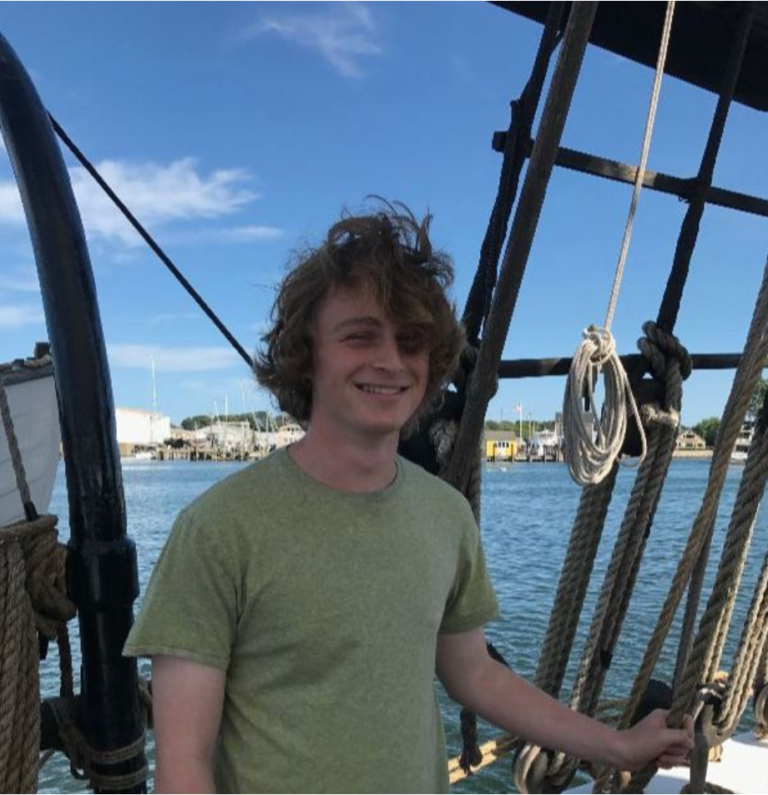
Recovery Story:
August Rosenberg
“I grew up in an expressive, thoughtful household. I was always interested in creativity and thinking. But as I entered my teens, I started smoking pot. I had found excitement in learning until sophomore year of high school, when I became reserved and felt as though existence was meaningless. Everything was grey. I’ve heard that most people can endure hardships as long as they have something to believe in and contribute to—for me there was nothing. I did worse in school and lost sleep and friends. Then, one weekend before midterms, I started seeing things, things that turned horrifying, and thinking stranger and stranger thoughts. Eventually, I was sent to the hospital for my behavior. That night in the emergency room was a long one. I was bound to a stretcher, connected to cables, and prevented from privately using the bathroom despite my defiance.
After leaving the inpatient program I was opposed to medication, until my parents gave me the incentive of buying me a membership to RuneScape, the videogame, if I agreed to give medication a try. I started taking clozapine and could figuratively view the world in color again; my hallucinations were gone for the most part as well. However, now my thoughts were in a world of their own. I used what I call my delusions to search for a philosophical truth—a truth that would prove the nihilism of the grey phase and the chaos of my psychotic break wrong. The magic of my delusions seemed to be the answer. I didn’t understand why people would distance themselves from me when I spoke of my experience. Most people, including professionals, attempted to rationalize my beliefs away, causing me to feel even more alone.
Gradually, my thoughts became more and more disturbing. I came to see my own father as evil. But my parents remained by my side. They supported me to run three marathons and meet peers after being ostracized from the ‘normal’ kids. I gained great empathy for those struggling, people I had met through programs and group sessions. My mother connected me with a peer mentor, who gave me a glimpse into a social world beyond my own. My mother was always there to take care of me and give love and nonjudgement, just encouraging me to live. As my dad and I started having philosophical conversations, he helped show me that real life could be meaningful and that he was in fact my loving, wise, father. I got perspective on my delusions enough to see that they were tiring me out and scaring me. With the aid of Cognitive Behavioral Therapy (CBT), I was able to go back over my delusions and reality test them.

“…My mother connected me with a peer mentor, who gave me a glimpse into a social world beyond my own…”
As I entered college, I left my delusions behind. I made friends with students and got a taste of being stable. I did well enough academically to transfer to an academically stronger college. However, I still had intrusive fear of the uncertain—fear that there was no logical reason to live. This kept me from fully engaging and often left me ruminating. Although my self-esteem had grown from high school, it was still markedly low. After studying philosophy to no avail, the nihilism was returning—right after entering my second college. I was back at the edge of the void. But as always, I called my dad. He suggested this thing called mindfulness. This allowed me to let go of my paranoid thoughts, and to stop battling them with logic. Currently, I use a mantra to stabilize my mind and be present in the world. I also continue to run frequently and am completely sober.
For me, I had to see the beauty of life to make a change. Additionally, I had to find gentle, unforced ways to reintegrate myself into life and address my paranoid thoughts. I have graduated college with honors and have reconnected with the friends I lost due to my grey phase. I experienced a small relapse of hallucinations that I think was due to smoking cigarettes, but am keeping them under control. I also still experience paranoid thoughts and low self-esteem, but am improving every day. I am confident that I can become even more present though applying Acceptance and Commitment Therapy, which would help me come to even more peace with my thoughts. I am now working as a Certified Peer Specialist and finding meaning in giving back.”
August Rosenberg, CPS